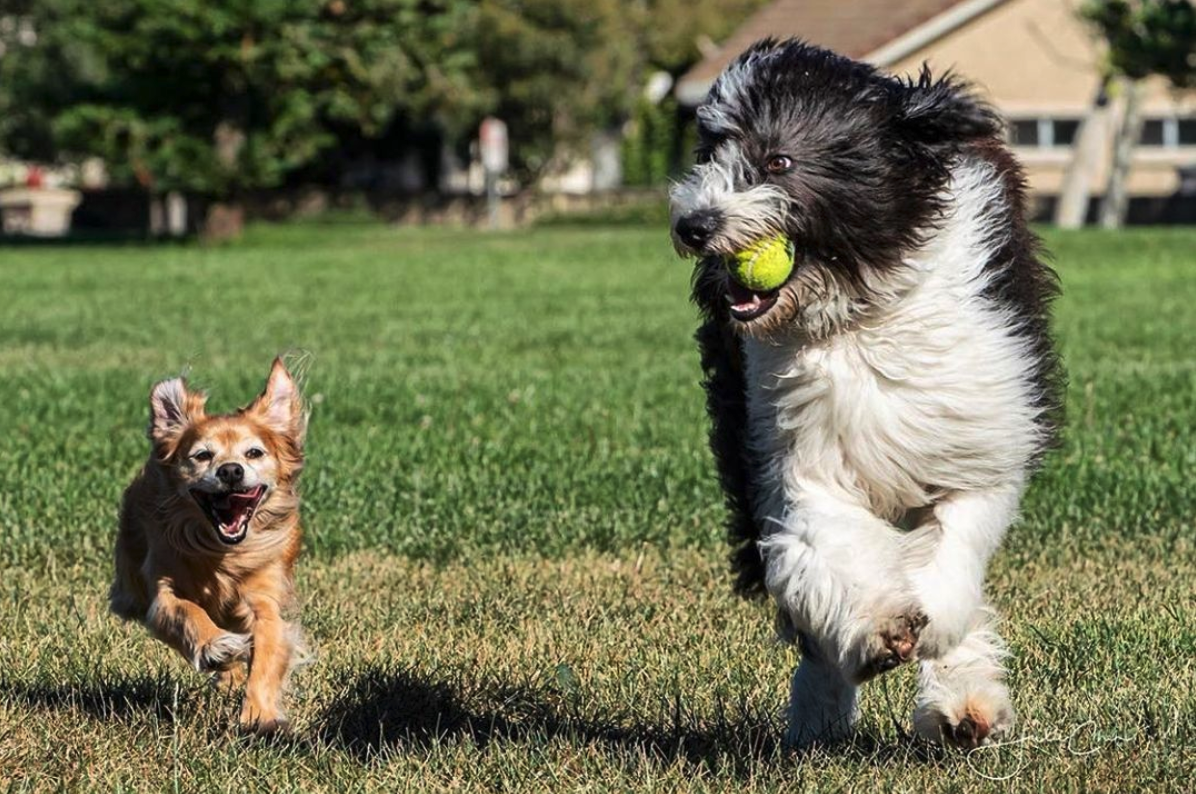Bordoodle Health
Bordoodles are a relatively new breed of dog, only being recognized by the American Canine Hybrid Club, and Designer Breeder Registry, among other kennel registries within the last 8-10 years. With the rising popularity of Bordoodles you might find yourself wondering how their health compares to that of similar breeds.
Bordoodles may very well be the healthiest of all “doodles” existing today. Because the Border Collie has always been bred for health and temperament as opposed to looks, the Border Collie is considered one of the healthiest purebred breeds in the world. A good breeder will DNA test both the Border Collie parent and the Poodle parent to ensure that they are free of any mutated gene that may cause certain diseases that poodles and/or Border collies may be predisposed to developing. A good breeder will also perform OFA (Orthopedic Foundation for Animals) testing on the parent dogs prior to breeding to ensure that they have no predisposition to hip dysplasia or joint problems.
Because of the strong genetics of the Border Collie and Poodle, their life span averages between 13-16 years. This is based on the study of Poodles living 12-15 years and Border Collies living to be 14 -17 years of age. Actual studies on the life span of the Bordoodle have not been concluded as the breed is only about 10 years old. Thus, the time span stated is an average of both the Border Collie and Poodle. This does not take into consideration the “Hybrid Vigor” factor.
Overall Health
Thankfully, the Bordoodle is composed of two fantastic breeds known for their good health. Standard Poodles have an outstanding Coefficient of Inbreeding (COI) of 2.3%. This is a metric used to determine the level of inbreeding. Having such an excellent COI means that the chance of the Poodle’s offspring inheriting poor recessive traits is reduced. Then we have the Border Collie. A majestic breed crafted with health and temperament as the focus, rather than looks. Primarily used as working dogs Border Collies are very versatile having been successful in many different disciplines across the country, rightfully named the world's smartest dog breed!
One can only imagine the incredible feat it is to see the two joined as one creating our beloved Bordoodle. Our Bordoodles have been bred for pristine health and temperament. One of the most important aspects of creating healthy offspring is DNA testing. We test the DNA of both intended parents prior to breeding. This is to eliminate the risk of breeding dogs that could be affected by mutated genes that could lead to diseases later in life. Having this genetic information allows us to see if either parent is predisposed to developing these diseases. Additionally we perform OFA screenings prior to any breeding to ensure that they don't hold any predisposition to hip dysplasia, elbow dysplasia, or any other joint problems.
A Bordoodle’s health is truly something special. They’ve even been deemed as one of the healthiest “doodles” existing in today’s world! We hold so much confidence in their health that we stand by our dogs with a 10-YEAR Health Guarantee for every one of our Bordoodles.
Life Expectancy
Because Bordoodles haven’t been around as long as more established breeds, there have not been any formal studies on the lifespan of the Bordoodle. The average life expectancy of a Standard Poodle is 12-15 years, whereas the average life expectancy of a Border Collie is 14-17 years on average. Strong genetics allow us to estimate that the Bordoodle’s life expectancy should land around 13-16 years on average. However, some believe that Bordoodles could have an extended life expectancy based on the Hybrid Vigor factor, also known as Heterosis.
(taken as the average from a Poodle’s, and a Border Collies average life expectancy)
-Bordoodles Life Expectancy: 13-16 years
-Standard Poodle Life Expectancy: 12-15 years
-Border Collie Life Expectancy: 14-17 years
Temperament and Health of the Mind
Generally speaking, we’ve found that Bordoodles have exceptional temperaments. They’re very sweet dogs who bond closely with their families. Playful, incredibly smart, and generally low maintenance. Bordoodles are quite tolerant of anyone they meet in their daily lives and do exceptionally well with children. Their prey drive is not overwhelmingly high, while they still hold the fantastic ability to focus intently and exhibit good work ethic. This breed’s temperament is truly the best of both worlds.
Each Bordoodle puppy is unique in the sense that they can develop their own personality and quirks. Each puppy may be different in its preferences, some being more playful than others, some showing they have a more reserved nature. One individual may be more independent than it’s related counterparts.
The Volhard Puppy Aptitude Test is what we use to determine the natural temperament of our puppies. Such testing can show us if a particular puppy is assertive, outgoing, timid, etc. This helps us to pinpoint what type of lifestyle each dog is most suited for. Some are best suited for a warm loving life as a pet, some show us they are perfect for a life of sporting activities such as competing in agility, while others may have a temperament that would lead them to excel as a working service dog or therapy dog.
Breed Specific Health Issues
Bordoodles are a hybrid breed of dog, and for this reason they are susceptible to any of the health problems that affect both parent breeds. Thankfully, due to our strict Breeding Standards (DNA testing and OFA screening) the likelihood of our puppies facing any of these issues is reduced tremendously.
Addison's disease
Allergies
Cancer
Canine epilepsy
Canine hip dysplasia
Collie eye anomaly (CEA)
Gastric dilatation volvulus
Hypothyroidism
Juvenile renal disease
Lens luxation
Osteochondritis dissecans
Patent ductus arteriosus (PDA)
Progressive retinal atrophy
Seizures
Tracheal collapse
Coat Health
The coat health of a Bordoodle often depends on the owner’s vigilance in grooming the dog. The Bordoodle’s parent breed is the Standard Poodle, which has a curly coat that continuously grows. Therefore the Boredoodle does have the chance to inherit this trait. However some Bordoodles have coats more akin to that of a Border Collie. Some Bordoodles may shed, while others will grow their hair continuously. (The type of coat can usually be determined by the breeder around 6 weeks of age.) Both coats are normal and expected in the breed.
Regardless of coat type Bordoodles do require proper grooming. A Bordoodle’s coat can easily become matted without regular combing of the hair. If the fur gets matted this can be painful for the dog, and require the mats to be shaved out. Bathing and clipping of the coat is necessary to maintain a clean healthy coat for this breed.
Additionally, diet can play a key role in a Bordoodles coat's health. High quality comercial foods are typically high in omega -3 and -6 fatty acids which increases the quality of your furry friend’s coat. Supplements are also available for those who feed a home-prepared diet, or a lower quality commercial dog food. Having a healthy dog inside and out will give him what he needs to produce the natural oils that protect the health of his coat.
Diet
Diet plays a key role in the overall health of your Bordoodle. New studies have led veterinarians to believe there is a strong correlation between the increasingly popular grain-free commercial dog foods and canine heart disease (commonly known as dilated cardiomyopathy or DCM). Contrary to popular belief it’s not necessarily the lack of grain that causes DCM, but rather the legumes added to replace lost nutrients when the grain is removed. These legume-rich foods lack the taurine every dog needs. All this can lead to a taurine-deficiency which ultimately weakens and enlarges the heart, affecting its ability to pump blood to the rest of your furry friend’s body. Feeding a reputable dog food is incredibly important for your pet’s health. Select a diet that is approved by your pet’s veterinarian if you’re unsure. Bordoodles are generally not fussy eaters and it’s not common for them have issues when it comes to being underweight or becoming obese. Sticking to a proper feeding schedule with properly portioned meals is one very simple way you can protect the health of your bordoodle.
It’s also important to note that too many treats or table scraps could lead to your Bordoodle becoming selective or “picky” when it comes to meal time. But this is easily prevented by simply monitoring what your dog consumes through his daily life. Always offer food with the longevity of your dog in mind, as this plays a key role in the long term health of your Bordoodle.
Bordoodle Exercise Needs
Exercising your Bordoodle greatly contributes to his overall health. Keeping your Bordoodle active consistently is such a key component to extending his ability to have a long and happy life by your side. Research has shown that exercise also helps extinguish behavioral problems! Barking, licking, chewing, digging can all be reduced with regular exercise. Keeping your dog active also builds confidence in your dog reducing anxiety related behaviors.
While each Bordoodle is unique, they all tend to need a moderate amount of exercise. Having a large yard to run in, or being involved with people who have an active lifestyle tend to help the Bordoodle to excel in his role in the family. A 10 minute walk each day may not make the cut, as this is a very mindful breed who needs both mental and physical stimulation. However it is still worth noting that each Bordoodle’s specific exercise requirements can vary based on their natural temperament. For example a dog who exhibits more anxiety will require more physical exercise and stimulation than a dog who exhibits less anxiety. Bordoodles are a combination of the world's two smartest dogs. So for this reason they enjoy the mental and physical demand of playing games, practicing known tricks, and going on new adventures with their beloved family members.
Bordoodle Growth Variations
Bordoodles are made up of the two parent breeds; Border Collies and Poodles. For this reason they can come in a variety of sizes. This will generally be impacted by the size of the Poodle parent. The average max weight can reach up to 80lbs, whereas the average low can be as small as 20lbs. With this in mind, most Bordoodles tend to land somewhere in the middle around 35lbs-45lbs. This is close to the average size of a Border Collie. Height is not quite as drastic. The average being around 18”-22” tall. (measured from the ground to the highest point of the dog's shoulder blades or “withers”) However, height can still vary outside of the average anywhere from 15”-26” tall. These dogs are unique and can vary a lot in the sizes they come in. This is handy for selecting the perfect dog for the perfect family. Some who would prefer a smaller dog can get all the joys of owning a Bordoodle and still have the smaller size dog that would suit their lifestyle. For those who are in the market for a larger companion but have fallen in love with the breed can still find the perfect size Bordoodle that meets their needs as well.












